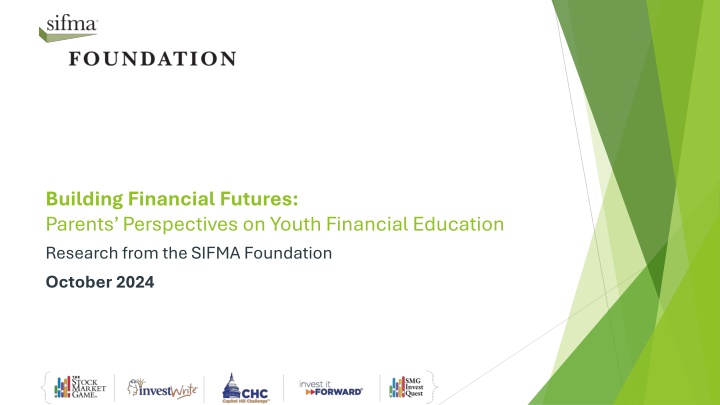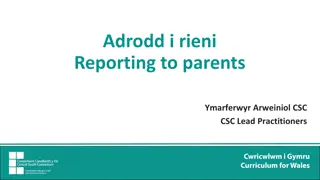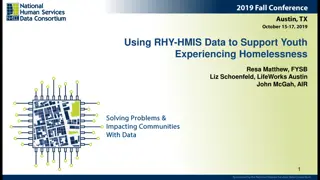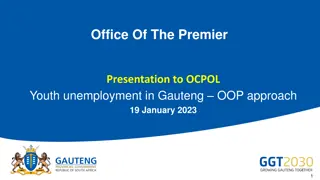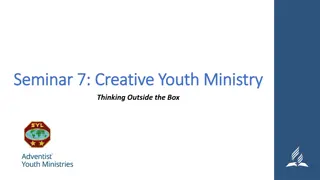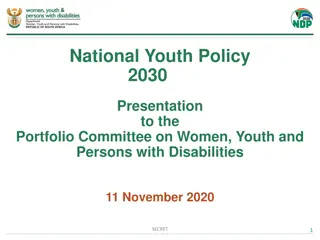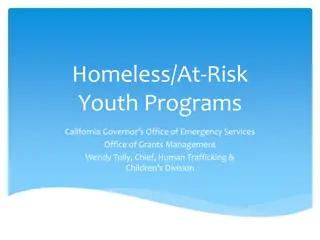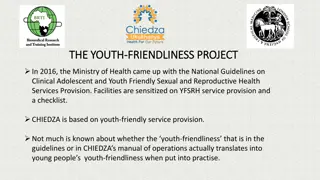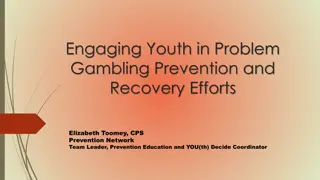Parents' Perspectives on Youth Financial Education Research
This research conducted by the SIFMA Foundation in October 2024 delves into parents' views on the importance of teaching children about investing for their financial future. While most parents agree on the significance, many feel less confident in their ability to impart this knowledge at home, highlighting the need for enhanced financial education resources. The study also reveals gender disparities in confidence levels. Explore the findings to gain insights into shaping financial education programs and bridging the opportunity gap for young individuals.
Download Presentation

Please find below an Image/Link to download the presentation.
The content on the website is provided AS IS for your information and personal use only. It may not be sold, licensed, or shared on other websites without obtaining consent from the author.If you encounter any issues during the download, it is possible that the publisher has removed the file from their server.
You are allowed to download the files provided on this website for personal or commercial use, subject to the condition that they are used lawfully. All files are the property of their respective owners.
The content on the website is provided AS IS for your information and personal use only. It may not be sold, licensed, or shared on other websites without obtaining consent from the author.
E N D
Presentation Transcript
Building Financial Futures: Parents Perspectives on Youth Financial Education Research from the SIFMA Foundation October 2024
About the survey Methodology The SIFMA Foundation is a leading non-profit focused on financial education and preparing underserved youth for wealth-building opportunities. The SIFMA Foundation s Building Financial Futures Survey was conducted by Wakefield Research among 1,000 nationally representative U.S. parents of kids in grades K- 12, between September 23rd and September 30th, 2024, using an email invitation and an online survey. Data has been weighted. We developed the Building Financial Futures survey to better understand and amplify the perspectives of parents of K-12 students regarding the importance of financial education in their children s schools. We believe the insights they offered are critical to shaping our own financial education programs offered by the SIFMA Foundation, and may inspire educators and school administrators around the country to think about how they can incorporate financial education into their own classrooms. Results of any sample are subject to sampling variation. The magnitude of the variation is measurable and is affected by the number of interviews and the level of the percentages expressing the results. For the interviews conducted in this particular study, the chances are 95 in 100 that a survey result does not vary, plus or minus, by more than 3.1 percentage points from the result that would be obtained if interviews had been conducted with all persons in the universe represented by the sample. We invite you to review the results of this survey and hope you will join us on our mission closing the opportunity gap by fostering greater knowledge of the financial markets for young people of all backgrounds. 2
Nearly all K-12 parents (92%) agree its critical that their child learns to invest. Question: How strongly do you agree or disagree with the statement below? It s critical that my child(ren) learn how to invest so they can prepare for their financial future. More than 9 in 10 parents (92%) believe it is critical that their children learn how to invest to prepare for their financial future, including 58% who agree strongly with this statement. 58% 34% 5% 3% Strongly agree Somewhat agree Somewhat disagree Strongly disagree 3
However, 78% of parents are not completely confident in their abilities to teach their children how to invest. Question: How confident are you in your ability to teach your child(ren) about investing basics at home? 31% Nearly 4 in 5 parents (78%) aren t completely confident in their ability to teach their children about the basics of investing at home, demonstrating the need for children to have access to this information from another source. 28% 22% 13% 6% Completely confident Mostly confident Somewhat confident Not too confident Not at all confident 4
Women are notably less confident in their ability to teach their children about investing basics. Question: How confident are you in your ability to teach your child(ren) about investing basics at home? Male Female More than 4 in 5 moms (83%) aren t completely confident in their ability to teach their children the basics of investing at home, including more than a quarter (28%) who are not too / not at all confident in their ability to do this. 41% 33% 29% 22% 21% 18% 17% 9% 7% 1% Completely confident Mostly confident Somewhat confident Not too confident Not at all confident 5
Parents arent confident because most of them arent experienced enough with investing to teach their children about it. Question: How would you describe your experience with investing to build long-term wealth? For example, investing in stocks, bonds, real estate. Few parents of K-12 students have personal experience to draw on in teaching their children about the basics of investing. 30% 29% 28% More than a quarter (29%) don t have enough money or know- how to invest at all, while others have investments but don t have the experience of actively managing them (28%) or have dabbled in investing but feel they don t really know what they re doing (14%). 14% I am an active investor and regularly review and monitor my investment strategy I have investments (e.g., 401K) but do not take an active role in managing them I ve dabbled in investing but feel like I don t really know what I m doing I know this is important, but I don t have enough money or know-how to do it 6
Schools fill the gap. 74% of parents would move their children to a different school if it offered financial education. Question: All else being equal, how likely would you be to enroll your child(ren) in a different school if it offered financial education and investment courses? 47% Nearly three-quarters of parents (74%) would enroll their children in a different school if it offered financial education and investment courses, demonstrating just how important they believe this is to their children s future success. 27% 21% 5% Definitely would Probably would Probably wouldn t Definitely wouldn t 7
In fact, nearly all (91%) the parents say a class about investing would be more valuable than many required K-12 classes. Question: How strongly do you agree or disagree with the statement below? A class or program in school about investing would be more valuable to my child(ren)s future success than many of the required K-12 classes. 46% Nearly all parents recognize the value of including investment classes in their children s curriculum in school. In fact, 91% indicate a class or program in school about investing would be more valuable to their children s future than many of the required K-12 classes. 45% 7% 2% Strongly agree Somewhat agree Somewhat disagree Strongly disagree 8
Parents feel that financial education in schools is important to eliminating economic inequalities. Question: How strongly do you agree or disagree with the statement below? Financial education in schools is critical to eliminating economic inequalities. The importance of learning to invest goes beyond simply ensuring their own children are prepared for the future. The vast majority of parents (88%) view financial education in schools as critical to eliminating economic inequalities. 50% 38% 7% 5% Strongly agree Somewhat agree Somewhat disagree Strongly disagree 9
More than three-quarters of parents (76%) think that financial education should start before high school. Question: At what grade level should children start learning about finances in school? 27% 24% More than three-quarters of parents (76%) believe children should start learning about finances in school before they reach high school, including more than half (52%) who feel this education should begin by at least the 6th grade. 16% 14% 8% 6% 3% 2% Kindergarten 1st 2nd grade 3rd 4th grade 5th 6th grade 7th 8th grade 9th 10th grade 11th 12th grade This isn t something children need to learn in school 10
Most parents give their school district a passing grade on teaching financial skills. Question: What grade would you give your child(ren) s school district for how well their current tools and curricula enable them to prepare students with the financial skills they need to be successful in life? 33% Though just 19% of parents give their children s school district a failing grade (i.e., D, F) for how well their current tools and curricula enable them to prepare students with the financial skills they need to be successful in life, most parents nonetheless see room for improvement, giving their district a B or C. 28% 20% 19% A B C Fail 11
However, financial education access varies across the country. Parents in rural areas rate their school districts poorly. Question: What grade would you give your child(ren) s school district for how well their current tools and curricula enable them to prepare students with the financial skills they need to be successful in life? City / urban area Suburbs Rural area (for example: in a very small town in the country or on a farm) School districts in rural areas may be facing even greater challenges in ensuring students are adequately prepared with the financial skills they need using their current tools and curricula. 37% 36% 35% 34% 31% 31% Close to 2 in 5 parents in rural areas (37%) give their children s school district a failing grade in this area, with another 34% doling out a grade of C. 20% 17% 17% 16% 14% 12% A B C Fail 12
Its more important than ever before that children learn to invest well. Question: How strongly do you agree or disagree with the statement below? Recent shifts in the stock market have made it more important now than ever that my child(ren) learn how to invest well. How strongly do you agree or disagree with the statement below? Recent shifts in the stock market have made it more important now than ever that my child(ren) learn how to invest well. 50% 37% 10% 3% Strongly agree Somewhat agree Somewhat disagree Strongly disagree 13
About the SIFMA Foundation The SIFMA Foundation is committed to closing the opportunity gap by fostering greater knowledge of the financial markets for young people of all backgrounds. Drawing on the support and expertise of educators and the financial industry, the Foundation provides financial education to strengthen economic opportunity across communities and increase awareness of the benefits of the global marketplace. Since 1977, the Foundation s flagship program, The Stock Market Game , has guided more than 23 million students on their path to financial independence by attaining stronger life skills, improving academic achievement, and boosting their social-emotional learning. For more information on the SIFMA Foundation, visit www.sifma.org/foundation. For more information, please contact: Michael Sherman, SIFMA Foundation, msherman@sifma.org John Welch, Edelman Smithfield, John.Welch@edelmansmithfield.com
